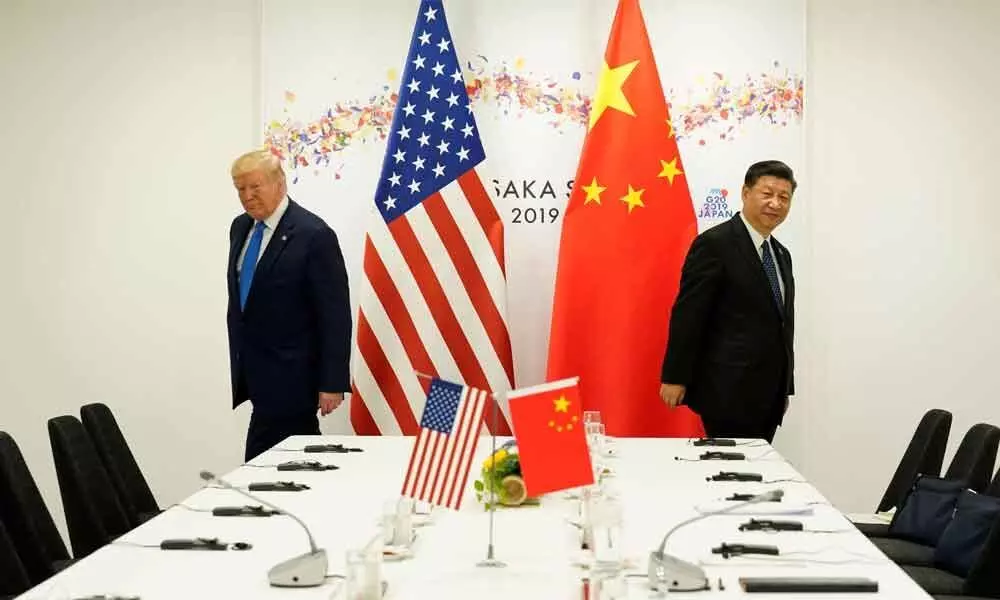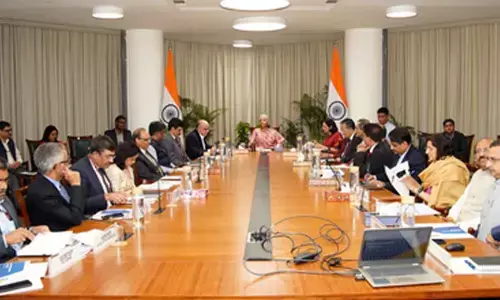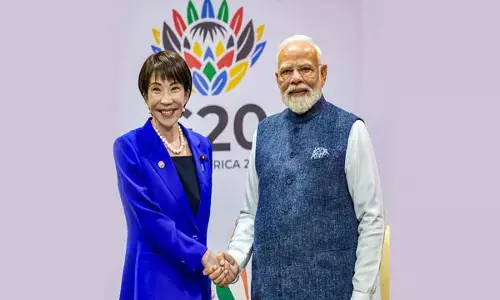Lessons from US-China trade war

The International Monetary Fund (IMF) has said that the ongoing trade war between the United States (US) and China will slow down the global economy. Yet both countries are not listening.
The International Monetary Fund (IMF) has said that the ongoing trade war between the United States (US) and China will slow down the global economy. Yet both countries are not listening.
Free trade means that goods will be produced in that country which can make them at the lowest price. If the cost of making a car in India is Rs 5 lakh and the cost of making the same car in the US is Rs 7 lakh; then it is better to manufacture the car in India; add, say, Rs 1 lakh for transport, export and sell it in the US for Rs 6 lakh.
The US consumer will be benefitted by such free trade. She will get the car for Rs 6 lakh instead of having to buy it for Rs 7 lakh in the absence of free trade.
It is clear, therefore, that free trade makes available goods to the consumer at a lesser price. We can see this in the availability of cheap goods like CFL bulbs that have been manufactured in China; exported to India and made available to the Indian consumer at a low price.
The US is benefitting hugely from free trade. It is importing cheap electronic items from China, garments from Bangladesh and sugar from Brazil. So, why is President Trump imposing import duties on goods imported from China?
That is increasing the cost of electronic items to the US consumer. More importantly, why is the US voter standing behind Trump? Why is he willing to axe his own feet by supporting Trump and being forced to buy expensive goods?
The answer lies in jobs. The wages are less in China, Bangladesh and Brazil. It is beneficial for US Multinational Corporations (MNCs) to produce electronics, garments and sugar in these countries and import the goods into the US.
They can make profits in the manufacturing in foreign countries and also make profits by importing and selling cheap goods. The problem, however, is that the US worker is left unemployed. The factories are located in China and employment is generated in that country.
The American consumer can buy the car cheaper at Rs 6 lakh, but he has no job and or money to buy it. For this reason, Trump is imposing high import duties on goods imported from China.
He is saying that American consumers need jobs first and cheap cars later.
In contrast, the American MNCs are arrayed against Trump. They want free trade. It does not matter to them whether jobs are created in the US or in China. They can sell more cars in the US if it is available at Rs 6 lakh and make more profits.
Free trade also leads to global competition. Car manufacturers in Germany, Mexico, India and China compete with each other. This leads to the invention and adoption of new technologies. For example, we had rejected free trade until the eighties.
We were producing Ambassador and Fiat cars that were giving an average of 13 kilometers per litre of petrol. We allowed MNCs to manufacture cars in India in the nineties. As a result, today we have cars giving average of up to 25 kilometers per litre.
Thus, the IMF has rightly warned that the trade war between the US and China will lead to a reduction in the growth rate of the global economy.
The same argument applies to China which is imposing high import duties on dairy products imported from the US to protect the jobs of its farmers.
The choice for both the US and China is whether to provide cheap goods to their voter-consumers or to provide jobs to their voter-workers. Both have rightly given priority to jobs over cheap goods. Thus, they are engaged in a trade war.
Voters of both countries have saved their jobs even though the trade war has deprived the same voters from access to the cheap imported goods. Thus, the people of both the US and China are happy. They have their jobs.
The IMF, however, is not happy. It wants to peddle the interests of the MNCs. It is shouting hoarse that trade war is bad for the global economy. That is only partly correct.
Indeed, the total production is less. But the IMF is hiding the fact that the trade war is helping both the US and Chinese people by protecting their jobs.
The situation would be fundamentally different if the Chinese farmer could migrate to the US and produce cheap butter in the US and export it to China; and the US workers could migrate to China and produce cheap cars in China and export them to the US.
However, since such movement of workers is not possible in the present-day world, it is better for both the US and China to embrace protectionism and protect the jobs of their workers. The trade war is not an aberration or a misguided policy as the IMF would like us to believe.
It is a logical result of free trade along with restrictions on the movement of workers. I have been saying since the adoption of the WTO Treaty in 1995 that free trade cannot sustain. Here we are.
There are two ways in which India can respond to the trade war. The US MNCs are relocating from China. Apple has moved to Taiwan, Foxcomm to India and Sharp to Vietnam in response to Trump's admonition to move away from China.
We could try to attract more of these MNCs, like we have attracted Foxcomm. I do not think this strategy will sustain even though it may be beneficial immediately. Trump or his successor(s) will continue to protect the interests of the US worker after the MNCs relocate to India.
In course of time they will be forced to engage in a trade war with Taiwan, India and Vietnam to protect their workers, just as they are engaged with China today. Vietnam, for example, is running a trade deficit of US Dollars 39 billion with the US.
Sooner or later, the US government will have to start a trade war with Vietnam to close this deficit. Therefore, instead of running after short term gains from attracting MNCs, we should adopt our own trade war and close our borders for all non-essential imports so that our people can have jobs. The government of India has to choose between the interests of its people and the interests of the MNCs.
The writer is formerly Professor of Economics at IIM Bengaluru








